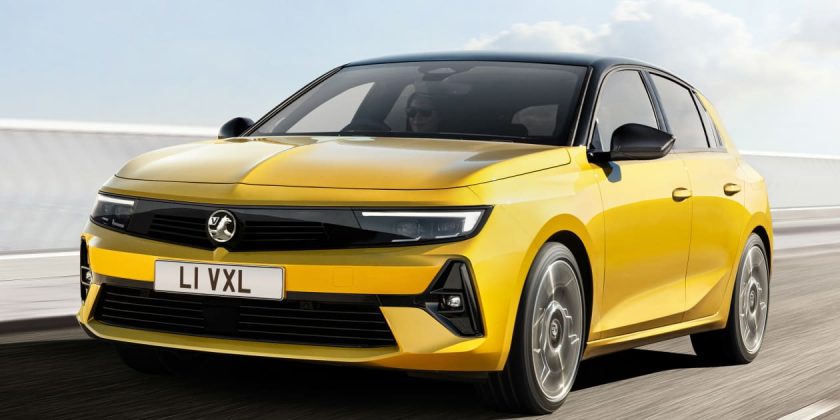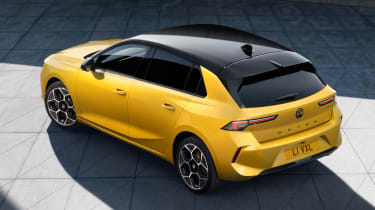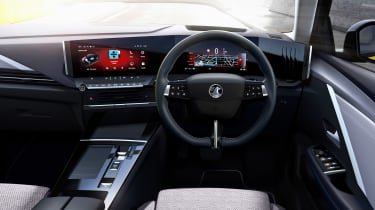The Mk8 Vauxhall Astra is available in a choice of three trim-levels and will be offered with a plug-in hybrid powertrain for the first time
The new Vauxhall Astra is available to order now, priced from £23,275. First deliveries of the eighth-generation hatchback will arrive early next year, ready to rival the likes of the Ford Focus and the Volkswagen Golf.
Three trim-levels are available, called Design, GS Line and Ultimate. Design is the cheapest and comes with 16-inch alloy wheels, LED headlights, rear parking sensors and lane-departure warning.
New Vauxhall Astra prototype review
Inside, the Design model gets a 10-inch digital instrument cluster and a 10-inch infotainment system with Apple CarPlay and Android Auto. Vauxhall has also retained the physical buttons for the car’s air-conditioning controls for ease of use.
Prices for the sporty GS Line model start from £26,170. Upgrades over the base-model include black 17-inch alloy wheels, a contrasting black roof, privacy glass and a black badge for the front grille. The driver’s seat is also swapped for one certified by AGR (the Campaign for Healthier Backs), which Vauxhall says is more comfortable and supportive than the standard seat.
There’s a little more equipment, too, including front and rear parking sensors, active cruise control, traffic-sign recognition and a 360-degree camera. Automatic models also come with shift paddles behind the steering wheel.
Prices for the range-topping Vauxhall Astra Ultimate start from £29,285. Upgrades over the GS Line variant include 18-inch diamond cut alloy wheels, Vauhall’s improved Pixel LED headlights, a heated windscreen and a sunroof.
The cabin also gets a lift with a head-up display, a wireless smartphone charger, Alcantara upholstery and an AGR-certified seat for the passenger. Rear cross-traffic alert and a semi-autonomous lane-changing function round off the specification.
New 2022 Vauxhall Astra: engines and drivetrains
The Vauxhall Astra will be available with a pure-electric powertrain from 2023 but, from launch, the hatchback will be offered with a choice of two petrols, one diesel and a plug-in hybrid powertrain.
The range kicks off with a turbocharged 1.2-litre three-cylinder petrol unit, that can be had in either 108bhp or 128bhp forms – both of which deliver up to 52.3mpg. Prices for the 128bhp variant start from £23,875. Both units also come as standard with a six-speed manual gearbox, although an automatic is available on the more powerful model.
CO2 figures stand at between 123 and 125g/km for the 108bhp version and between 122 and 127g/km for the more powerful model, which is also available as an automatic. The automatic option drops fuel economy to 51.4mpg, though.
The sole diesel option generates 128bhp and 300Nm of torque – a boost over the 230Nm figure of both petrol engines – and achieves a claimed 64.3mpg on the WLTP cycle, depending on spec. Prices for the diesel-equipped Astra start from £24,875.
Prices for the plug-in hybrid variant start from £32,200. It features a 1.6-litre four-cylinder petrol engine and an electric motor – and it generates 178bhp and 360Nm of torque. The system is also used by the new Peugeot 308, with which the Astra shares its Stellantis EMP2 architecture.
The 178bhp hybrid accelerates from 0–62mph in 7.7 seconds, before reaching a top speed of 140mph. Vauxhall will also launch a more powerful 222bhp version of the PHEV system, which shaves 0.2 seconds off that 0–62mph time and increases the Astra’s top speed to 146mph. Whether or not this model will come to the UK is yet to be confirmed, though.
Vauxhall claims 201.8 to 256.8mpg and 24 to 31g/km of CO2 on the WLTP cycle for both models, depending on spec. This is along with an electric-only range of around 35 miles, thanks to a 12.4kWh battery. All hybrid Astras send drive to the front wheels through an 8-speed automatic gearbox.
New 2022 Vauxhall Astra: design and interior
The eighth-generation Astra pulls plenty of design inspiration from the Mokka SUV, adopting Vauxhall’s new Vizor grille and headlamp arrangement. The latest iteration of the company’s Griffin logo also appears on the car’s nose and tail.
The narrow headlamps follow the brand’s latest design language, and buyers can optionally upgrade them with Vauxhall’s latest Intelli-Lux LED Pixel technology. The lamps have 168 LED elements between them, and they can automatically adjust the beam pattern to light up challenging roads or avoid dazzling oncoming road users.
Riding on Stellantis’s EMP2 platform, the new Astra measures 4,374mm long and 1,860mm wide – and the new underpinnings mean torsional rigidity is up by 14 per cent compared with the previous car’s. The wheelbase has also grown by 13mm to 2,675mm, which should liberate a little extra space for rear-seat passengers. Boot space stands at 422 litres, which is 41 litres more than you get in the Volkswagen Golf.
Vauxhall has completely overhauled the Astra’s cabin, too. The brand’s Pure Panel digital cockpit setup is drafted in from the Mokka, bringing two widescreen 10-inch displays – one for the instruments and one for the infotainment system. Wireless Apple CarPlay and Android Auto are supported.
The company’s designers have simplified the previous car’s dashboard, moving the controls for the air-conditioning and ventilation systems on to a slim row of buttons below the infotainment screen. The setup is paired with a new steering wheel design.
Vauxhall’s engineers paid particular attention to the Astra’s driving position, which has dropped by 12mm over the old car’s. The seats are another clean-sheet design, claiming to be both comfortable and supportive – and they’ll be available with ventilation and massage functions, as well as Alcantara upholstery.
New 2022 Vauxhall Astra: technology and equipment
Driver-assistance technology is another target area for improvement for the Astra, so Vauxhall has thrown all it has at this new model. Four cameras are equipped around the car’s body to support key driver aids and driving assistance functions, as well as a multifunction camera mounted in the windscreen. There are also five radar sensors and ultrasonic sensors at the front and rear.
All of this equipment sends data to Vauxhall’s Intelli-Drive system. It’s a semi-autonomous driving assistant that can take control of the car’s acceleration and braking, and perform lane changes on the motorway, providing the driver keeps their hands on the wheel.
On models with an automatic gearbox, the system can even bring the car to a halt and automatically set off again in stop-start traffic. Other features include a 360-degree parking camera, traffic sign recognition, rear cross-traffic alert and active lane positioning, which can provide steering assistance to keep the Astra in the middle of its lane.
First deliveries are scheduled to arrive early next year, and a more practical Sport Tourer estate version will follow in late 2022.
What does the new Vauxhall Astra have to beat? Check out our list of the best hatchbacks on sale now…
Source: Read Full Article


 New Vauxhall Astra prototype review
New Vauxhall Astra prototype review
